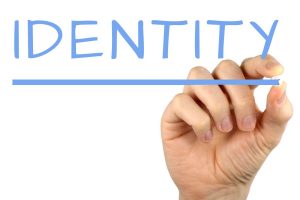
NOT THE MAGAZINE COVER FOR IDENTITY
Identity is a new Gay Journal published by the National Gay Switchboard in Dublin. At the time of writing Gay Star No. 10) three issues had appeared, the latter two of which are discussed here.
Let it be said straight away that ‘Identity’ is very welcome. It is modeled though not too obviously on journals such as Body Politic and Christopher Street in that it seeks to combine substantial literary content (short stories, poems, reviews of books and films) with political polemics and special items of news and current day affairs.
A good balance has been struck and the serious is necessarily tempered by the humourous. The writing is in general of a high standard, and it is never less than interesting. ‘Identity’ wisely eschews long, rambling, and invariably tedious ‘consciousness-raising’ in favour of shorter, more trenchant pieces, which in most cases make a strong impact. The diversity of the journal is its greatest strength.
Several items deserve mention – T C Breen’s admirably researched articles on the Dublin Scandals of 1884 (no. 21), and the ‘Strange Case3 of Bishop Atherton’ (No. 3), lend an instructive historical dimension to the paper; David Norris’s article on the Christian Churches (No. 2), is lucidly erudite if a little blib; Damian Stewart’s ‘Last Dance’ (No. 3), an engaging story which captures the ‘treadmill’ nature of the gay scene and the desperate anxieties of its patrons; and David O’Connor’s ‘Crumbs’, while frequently losing its way in the author’s frenetic attempts to intellectualize his characters, still manages to be a refreshingly unconventional piece of writing.
It is still possible to quibble. While some pieces in ‘Identity’, most notably those of Father Joe O’Leary and Conor Davidson, raise important controversial topics, there is nowhere to be found a serious discussion of them. the journal exudes a ‘Glad to be Gay’ tone which is to be applauded; equally necessary is a facility for self-criticism and a questioning approach to many aspects of current gay lifestyles.
discussion of them. the journal exudes a ‘Glad to be Gay’ tone which is to be applauded; equally necessary is a facility for self-criticism and a questioning approach to many aspects of current gay lifestyles.
It is to be hoped that in future issues, ‘Identity’ will open up debate on such topics as the positive and negative aspects of gay ghettoes, and the opinions before the Gay movement in its attempt to pursue political change.
Links:
- National Gay Federation – Identity
- Key dates for lesbian, gay, bi, and trans equality
- The Boys on the Rock by John Fox
The National Gay Federation is now known as National LGBT Federation (NXF) – 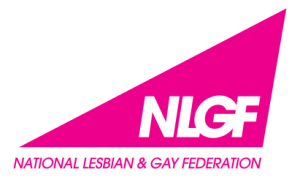

Review of ‘Identity’ first published in Gay Star No 10 (held int he Linenhall Library Archives)









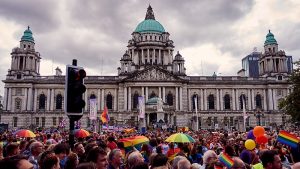
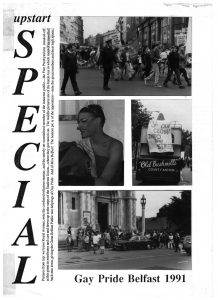


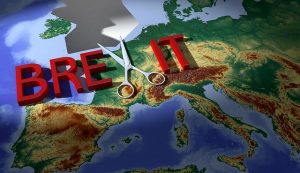 I have clearly stated many times that I found the departure from the EU to be a farce; so many lies, mistruths and out of it all we get the Brexit deal which is very close to scuppering the Good Friday Agreement. An agreement which is not perfect, has at least allowed the people of N Ireland to live relatively peacefully, and for the LGBTQ+ community to continue to fight for their rights, and most of the political parties now in N Ireland at least on paper support our community.
I have clearly stated many times that I found the departure from the EU to be a farce; so many lies, mistruths and out of it all we get the Brexit deal which is very close to scuppering the Good Friday Agreement. An agreement which is not perfect, has at least allowed the people of N Ireland to live relatively peacefully, and for the LGBTQ+ community to continue to fight for their rights, and most of the political parties now in N Ireland at least on paper support our community. advisors advising them to do so!
advisors advising them to do so! But bringing the article back to LGBTQ+ politics, I am afraid that the DUP’s latest little foray into trying to win the LGBTQ+ vote is limp handed. A few words by one of the team which are almost repudiated the next day by the leader in terms of ‘others should be apologising to us’ does not indicate a party that has accepted us. To this, we can also add the continued delay by the Prime Minister (Rt Hon Boris Johnston) with one review after another, and nothing actually happens – reminds me of
But bringing the article back to LGBTQ+ politics, I am afraid that the DUP’s latest little foray into trying to win the LGBTQ+ vote is limp handed. A few words by one of the team which are almost repudiated the next day by the leader in terms of ‘others should be apologising to us’ does not indicate a party that has accepted us. To this, we can also add the continued delay by the Prime Minister (Rt Hon Boris Johnston) with one review after another, and nothing actually happens – reminds me of 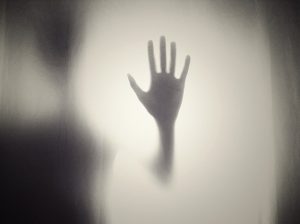
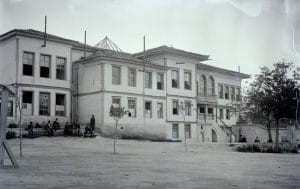 The list is endless, go and have a look at the Wikipedia article ‘Terrorism in Europe’ as a starting point.
The list is endless, go and have a look at the Wikipedia article ‘Terrorism in Europe’ as a starting point. Turkey, a country which is 97% Muslim and where LGBTQ rights have gone backwards in recent years. But similar pressure is being placed on LGBTQ freedom in other parts of Europe, e.g., Hungary and Poland. According to the European Union in 2020 43% of LGBTQ people, last year said they felt discriminated against, up from 37% in 2012.
Turkey, a country which is 97% Muslim and where LGBTQ rights have gone backwards in recent years. But similar pressure is being placed on LGBTQ freedom in other parts of Europe, e.g., Hungary and Poland. According to the European Union in 2020 43% of LGBTQ people, last year said they felt discriminated against, up from 37% in 2012. On July 1st, 2021 the PinkNews, in partnership with Citi and the Rainbow Project, under the title “Virtual Belfast Reception” organised a panel discussion on LGBT+ equality in Northern Ireland. The Virtual Belfast Reception online meeting involved Doug Beattie, UUP leader, Mary Lou McDonald, president of Sinn Fein, Colm Eastwood, SDLP leader, Naomi Long, Alliance leader and justice minister, and Mal O’Hara, a Green Party councillor in Belfast and the event was moderated by John O’Doherty, director of the Rainbow Project.
On July 1st, 2021 the PinkNews, in partnership with Citi and the Rainbow Project, under the title “Virtual Belfast Reception” organised a panel discussion on LGBT+ equality in Northern Ireland. The Virtual Belfast Reception online meeting involved Doug Beattie, UUP leader, Mary Lou McDonald, president of Sinn Fein, Colm Eastwood, SDLP leader, Naomi Long, Alliance leader and justice minister, and Mal O’Hara, a Green Party councillor in Belfast and the event was moderated by John O’Doherty, director of the Rainbow Project.

 Now that the lockdown is easing, we all have hidden pressure to go out and enjoy ourselves, which leads to more expenditure. However, if you follow this simple guide, you can ‘Make Saving Simple’, keep yourself in the black, and switch careful planning you can afford those guilty pleasures that we all long for.
Now that the lockdown is easing, we all have hidden pressure to go out and enjoy ourselves, which leads to more expenditure. However, if you follow this simple guide, you can ‘Make Saving Simple’, keep yourself in the black, and switch careful planning you can afford those guilty pleasures that we all long for.
 and the methods of measuring suicide attempts. Reference was also made to the Rainbow Project report ‘Through Our Minds’ which indicated that 25.7% of those who responded, ‘had at least one attempt at suicide.’
and the methods of measuring suicide attempts. Reference was also made to the Rainbow Project report ‘Through Our Minds’ which indicated that 25.7% of those who responded, ‘had at least one attempt at suicide.’ But in Northern Ireland, I would also suggest that the number of calls for support whether by phone, text or online will have gone up. Our youth have also suffered from the impact of the pandemic, and so many reports, studies and articles over the period have indicated that for so many that had to return home from university halls, or from rented accommodation which they could no longer afford had the ‘return to the closet’ syndrome as they either were not out to their families, or their families preferred that they kept a low profile.
But in Northern Ireland, I would also suggest that the number of calls for support whether by phone, text or online will have gone up. Our youth have also suffered from the impact of the pandemic, and so many reports, studies and articles over the period have indicated that for so many that had to return home from university halls, or from rented accommodation which they could no longer afford had the ‘return to the closet’ syndrome as they either were not out to their families, or their families preferred that they kept a low profile.